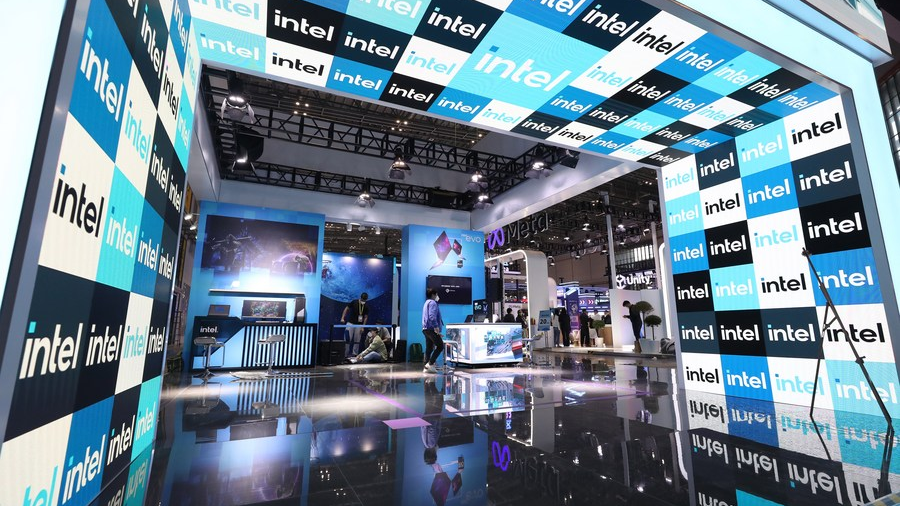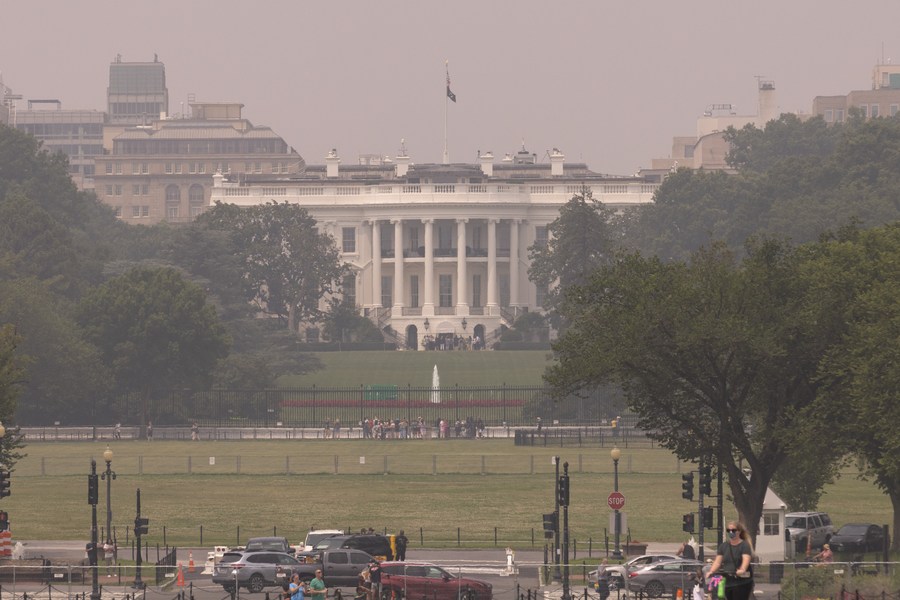
Workers set up the exhibition booth of Intel Corporation in preparation for the upcoming fifth China International Import Expo (CIIE) in east China's Shanghai, November 2, 2022. /Xinhua
Workers set up the exhibition booth of Intel Corporation in preparation for the upcoming fifth China International Import Expo (CIIE) in east China's Shanghai, November 2, 2022. /Xinhua
Editor's note: Radhika Desai, a special commentator on current affairs for CGTN, is a professor of political studies at the University of Manitoba in Canada. The article reflects the author's opinions and not necessarily the views of CGTN.
U.S. President Joe Biden announced a ban on U.S. investment in China's high technology sectors, including quantum computing, advanced chips and artificial intelligence sectors, on August 10.
The ban, like other anti-China measures going back to former U.S. president Donald Trump's ban on U.S. companies doing business with Huawei and Biden's ban on exports of certain advanced semi-conductor chips to China last October, is justified as necessary for security reasons, to prevent China's military from benefiting from U.S. technology. But, in reality, the purpose is to try to stall China's technological advance.
The new ban, to take effect next year, is the newest step in Washington's new cold war against China, which it began launching in the aftermath of the 2008 financial crisis and went into high gear under Trump. Biden has not only continued this new cold war but pursued it more systematically. Further steps are already being contemplated. For instance, Biden administration officials are reported to mull another round of these export bans on advanced technology chops.
This technology war, the throbbing heart of Washington's new cold war, makes little economic sense. It prevents U.S. firms from profitable exports and investment and certainly constitutes a major reversal of decades of "free trade" and "globalization" rhetoric from successive U.S. administrations. The White House admits as much when it justifies these measures not in economic but in security terms.
The logic of the new investment ban specifically is far from clear. U.S. officials responded to criticisms of the investment ban by saying, as the Financial Times reported, that it was meant to prevent "private equity and venture capital from introducing Chinese groups to other technology companies and experts. What we are trying to get at here is the intangible benefits... Ultimately China doesn't need our money." Pretty lame, even for the Biden administration.

The White House in Washington, D.C., the United States, June 29, 2023. /Xinhua
The White House in Washington, D.C., the United States, June 29, 2023. /Xinhua
Will the ban work? Certainly, it will have some effect. Indeed, the atmosphere of China-U.S. relations has already become so vitiated by Biden and his predecessor that many investors had already begun restricting their exposure to China even before Biden's announcement of the investment ban.
Whether the U.S. can win its tech war against China is another matter altogether. The simple fact is that U.S. companies have themselves been pioneering ways to evade it. Nvidia, an American multinational technology company, reacted to the October ban on exporting hi-tech chips by designing new ones not covered by the ban.
Industry interests will also do what they can to water down the provisions of the eventual legislation, given the importance of the Chinese market, turning what National Security advisor Jake Sullivan calls the "narrow yard, high fence" approach into a "tiny and irrelevant yard, low fence" one. Chinese companies will also find ways of circumventing these bans.
Moreover, other technologically advanced producers are unlikely to follow suit. Though the U.S. enjoys fervent backers in the leadership of the EU, the member states are another matter altogether. France, Germany and many other countries are already objecting that it is going to be really tough and that they are even more highly integrated into China than the U.S.
Above all, however, these bans and efforts to stall China's technological advance will fail for the simple reason that they are premised on the false assumption that China has advanced technologically by "stealing technology" from the U.S.
In reality, China's technological advance is based on two factors. First, like that of any country that has achieved technological advance, it is based on its ability to create a scientifically-trained workforce capable of absorbing and advancing technology. Secondly, unlike most other countries, the Chinese state has the capacity to prioritize technological advancement and has demonstrated that when it does so, it is capable of achieving objectives both surely and rapidly.
This capacity will undoubtedly ensure that banning the export of any technological product will simply hasten China's technological advance and make it autonomous from the U.S. The 2019 ban on Huawei is instructive in this regard. The New York Times reported recently that the ban forced Huawei to re-design and re-manufacture its products without U.S. parts and that it largely succeeded. The conclusion is inescapable. "The controls will not stop China permanently. Even in the best case, they're a delay tactic, meant to offer the U.S. and its allies space to expand their lead in key technologies," according to the New York Times.
Whether, in the chaotic political and policy environment they find themselves in today, an environment that is itself the social and political result of the West's decades-long addiction to neoliberal policy, they can use the space so created is another question entirely.
(If you want to contribute and have specific expertise, please contact us at opinions@cgtn.com. Follow @thouse_opinions on Twitter to discover the latest commentaries in the CGTN Opinion Section.)